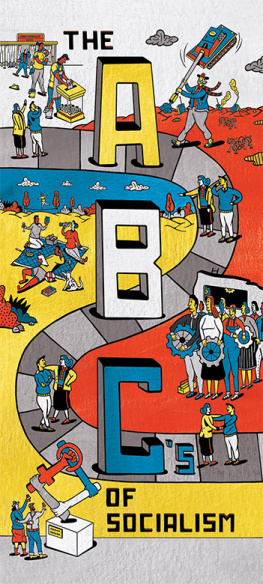Honneth - The idea of socialism towards a renewal
Here you can read online Honneth - The idea of socialism towards a renewal full text of the book (entire story) in english for free. Download pdf and epub, get meaning, cover and reviews about this ebook. City: Cambridge, year: 2018;2016, publisher: John Wiley & Sons, Inc.;Polity, genre: Politics. Description of the work, (preface) as well as reviews are available. Best literature library LitArk.com created for fans of good reading and offers a wide selection of genres:
Romance novel
Science fiction
Adventure
Detective
Science
History
Home and family
Prose
Art
Politics
Computer
Non-fiction
Religion
Business
Children
Humor
Choose a favorite category and find really read worthwhile books. Enjoy immersion in the world of imagination, feel the emotions of the characters or learn something new for yourself, make an fascinating discovery.
The idea of socialism towards a renewal: summary, description and annotation
We offer to read an annotation, description, summary or preface (depends on what the author of the book "The idea of socialism towards a renewal" wrote himself). If you haven't found the necessary information about the book — write in the comments, we will try to find it.
Honneth: author's other books
Who wrote The idea of socialism towards a renewal? Find out the surname, the name of the author of the book and a list of all author's works by series.
The idea of socialism towards a renewal — read online for free the complete book (whole text) full work
Below is the text of the book, divided by pages. System saving the place of the last page read, allows you to conveniently read the book "The idea of socialism towards a renewal" online for free, without having to search again every time where you left off. Put a bookmark, and you can go to the page where you finished reading at any time.
Font size:
Interval:
Bookmark:

To my sons Johannes and Robert, who have made everything easier from the very beginning
Translated by Joseph Ganahl
polity
First published in German as Die Idee des Sozialismus. Versuch einer Aktualisierung Suhrkamp Verlag, Berlin, 2015
This English edition Polity Press, 2017
Polity Press
65 Bridge Street
Cambridge CB2 1UR, UK
Polity Press
350 Main Street
Malden, MA 02148, USA
All rights reserved. Except for the quotation of short passages for the purpose of criticism and review, no part of this publication may be reproduced, stored in a retrieval system, or transmitted, in any form or by any means, electronic, mechanical, photocopying, recording or otherwise, without the prior permission of the publisher.
ISBN-13: 978-1-5095-1215-7
The Idea of Socialism
Library of Congress Cataloging in Publication Control Number: 2016044974
A catalogue record for this book is available from the British Library.
The publisher has used its best endeavors to ensure that the URLs for external websites referred to in this book are correct and active at the time of going to press. However, the publisher has no responsibility for the websites and can make no guarantee that a site will remain live or that the content is or will remain appropriate.
Every effort has been made to trace all copyright holders, but if any have been inadvertently overlooked the publisher will be pleased to include any necessary credits in any subsequent reprint or edition.
For further information on Polity, visit our website: politybooks.com
COURAGE yet, my brother and sister!
Keep on Liberty is to be subservd whatever occurs; That is nothing that is quelld by one or two failures, or by any number of failures,
Or by the indifference or ingratitude of the people, or by any Unfaithfulness,
Or the show of the tushes of power, soldiers, cannon, penal statutes.
What we believe in waits latent forever through all the continents,
Invites no one, promises nothing, sits in calmness and light, is positive and composed, knows no discouragement,
Waiting patiently, waiting its time.
Walt Whitman, To a Foild European Revolutionaire [1856], Leaves of Grass
As recently as a century ago, socialism was such a powerful movement that there was hardly any great social theorist who did not see the need to address it in detail sometimes critically, sometimes sympathetically, but always with great respect. John Stuart Mill was the first to do so in the nineteenth century, followed by Emile Durkheim, Max Weber, and Joseph Schumpeter, to name only the most important. Despite significant differences in their personal convictions and theoretical orientations, these thinkers agreed that the intellectual challenge socialism represented would have to permanently accompany capitalism. Today things look much different. If socialism finds any mention at all in social theory, it is taken for granted that it has outlived its day. It is considered unthinkable that socialism could ever again move the masses or be a viable alternative to contemporary capitalism. Virtually overnight Max Weber would not believe his eyes the two great nineteenth-century rivals have switched roles: Religion is perceived as the ethical force of the future, whereas socialism is regarded as a creature of the past. My belief that this is an overly hasty reversal and thus cannot be the whole truth is one of the two motives of this book. I will attempt to show that socialism still contains a vital spark, if only we can manage to extract its core idea from the intellectual context of early industrialism and place it in a new socio-theoretical framework.
My second motive for writing this book is the reception of my most recent, comprehensive study Freedoms Right. Yet I still felt the need to demonstrate that we only need to slightly adjust the perspective of Freedoms Right in order to open it up to an entirely different social order. Contrary to my original intention, therefore, I saw the need to follow up my larger study with a smaller one, which would more clearly define the vision entailed by the lines of progress already reconstructed from a strictly internal perspective.
For these two reasons I accepted an invitation to give the Leibniz lectures in Hanover in 2014, which I used as an opportunity to renew the basic ideas of socialism. I am very grateful to my colleagues at the Institute of Philosophy in Hanover, especially Paul Hoynigen-Huene, for allowing me to use their yearly lecture series to deal with what was most certainly an unfamiliar topic for them. I profited greatly from the discussions following the three lectures and gained a clear sense of the changes and additions I would need to make in order to present a second version of my lectures which would offer a much richer set of perspectives on a revised socialism. A cordial invitation by Rdiger Schmidt-Grply to accept the Distinguished Fellowship of the Friedrich Nietzsche Kolleg in Weimar in June 2015 gave me the opportunity to present the revised version of my text to a larger audience. A parallel seminar with students from the Studienstiftung des deutschen Volkes at the Wielandgut Ossmannstedt near Weimar enabled me to engage in several extremely fruitful discussions and to gather a number of suggestions for final corrections. I am very thankful to the participants in this seminar as well as to the director and the staff at the Kolleg for the interest they showed in my work.
I owe my gratitude to all the friends and colleagues for their advice during the production of the manuscript. Above all I would like to thank Fred Neuhouser, a close friend and trusted colleague in the Department of Philosophy at Columbia University, who gave me strong encouragement and a number of helpful suggestions from the very beginning of my work on the text. I have also profited greatly from the critical comments on the first version of my lectures made by Eva Gilmer, Philipp Hlzing, Christine Pries-Honneth and Titus Stahl. I am very grateful to them all for their years of help and attentiveness. Hannah Bayer and Frauke Khler supported me as always by gathering literature and aiding in the production of the manuscript. To them I am grateful as well. Finally, for this English edition I would like to especially thank Joseph Ganahl, who has worked with perfect timing and again done a wonderful job translating the book; additionally I am grateful to Kristina Lepold who came up with good solutions for translating some difficult German formulations into English.
Axel Honneth, June 2015
Our contemporary societies are characterized by a puzzling divide. On the one hand, discontent with the current socio-economic state of affairs, with contemporary economic and working conditions, has increased enormously in recent years. More than ever in the postwar era, people are outraged at the social and political consequences unleashed by the global liberalization of the capitalist market economy. On the other hand, this widespread outrage seems to lack any sense of direction, any historical sense of its ultimate aim. As a result this widespread discontent has remained oddly mute and introverted, giving the impression that it simply lacks the capacity to think beyond the present and imagine a society beyond capitalism. The disconnect between this outrage and any notion about the future, between protest and a vision of a better world, is a novel phenomenon in the history of modern societies. Ever since the French Revolution, major social movements have been motivated by utopian visions of a future society. Here we might think of the Luddites, Robert Owens cooperatives, council communism and other communist ideals of a classless society. But today, these currents of utopian thinking, as Ernst Bloch would have put it, seem to have been interrupted. Although the outraged have a clear sense of what they do not want and what outrages them about current social conditions, they have no halfway clear conception of the goal to which the change they desire should ultimately lead.
Font size:
Interval:
Bookmark:
Similar books «The idea of socialism towards a renewal»
Look at similar books to The idea of socialism towards a renewal. We have selected literature similar in name and meaning in the hope of providing readers with more options to find new, interesting, not yet read works.
Discussion, reviews of the book The idea of socialism towards a renewal and just readers' own opinions. Leave your comments, write what you think about the work, its meaning or the main characters. Specify what exactly you liked and what you didn't like, and why you think so.













